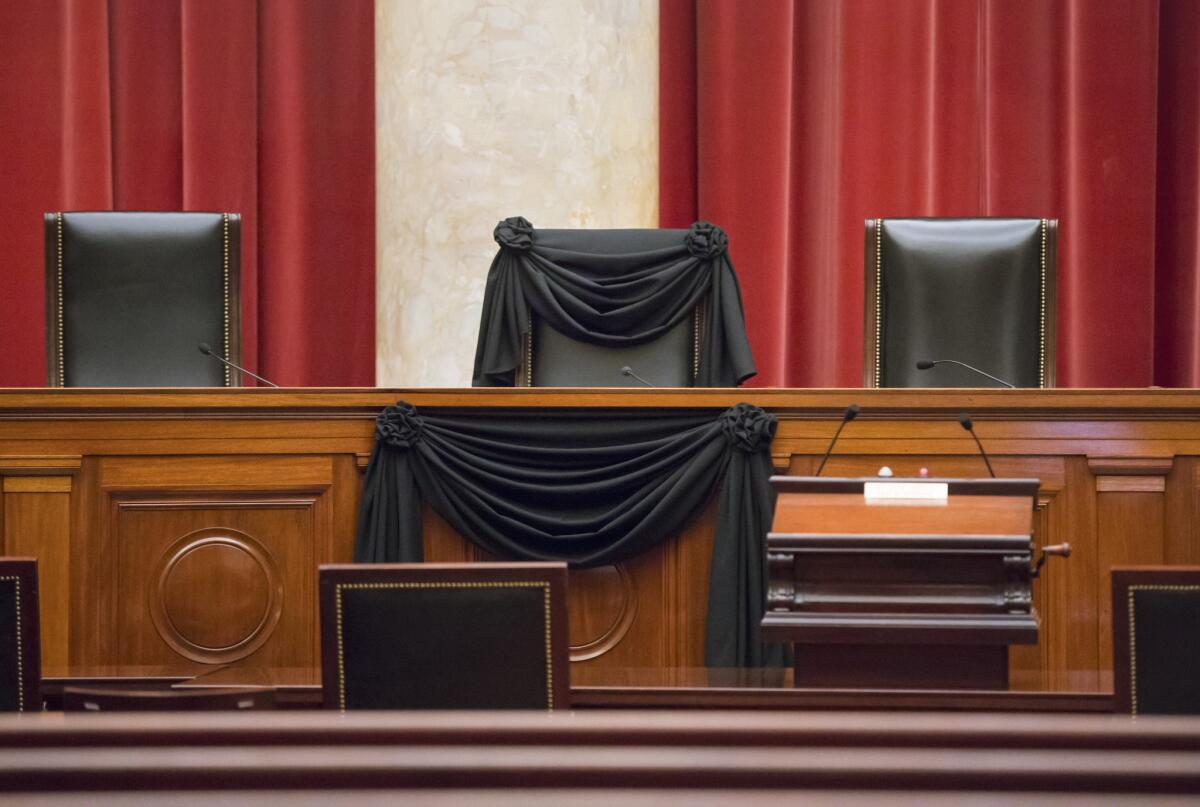Opinion: How about an honest debate over filling Justice Scalia’s seat?

Supreme Court Justice Antonin Scalia’s courtroom chair is draped in black Tuesday to mark his death, as part of a tradition that dates to the 19th century. Scalia died Saturday at age 79. He joined the court in 1986 and was its longest-serving justice.
- Share via
The opinionsphere continues to be chock full of declarations about the Supreme Court vacancy left by the unexpected demise of influential originalist (and moralizer) Antonin Scalia, including a spate of op-eds, editorials, blog posts and analysis pieces in this newspaper. And we’re just in the first chapter of what’s likely to be a very long book, with President Obama first weighing potential nominees, then sending one to the Senate, and then the drama beginning in earnest.
The thing is, we all know how this book ends. As I argued Saturday, there is no possible way the Senate votes on the nominee before the election. There’s no upside for Senate Republicans approving a nominee less reliably conservative than Associate Justice Samuel A. Alito Jr. — doing so would only alienate part of the GOP base, which Republicans need to turn out en masse in November. And the chance that Obama would nominate someone that far to the right is so infinitesimal, it cannot be measured with today’s technology.
So wouldn’t it be great if both Democrats and Republicans agreed to dispense with the spin and speak frankly about what they were doing?
Imagine Obama saying this before introducing his nominee:
“I knew the Senate wouldn’t give my pick a vote because of the politics of the situation. So I cast about for someone who not only would make a fine justice, but also raise the electoral stakes — someone who could excite registered Democrats, independent voters and possibly an entire demographic group. That way, if the public thought Senate Republicans weren’t treating my nominee fairly, they would take it out on them in November.
“My choice, (insert name here), not only has the standard nominee package of an exemplary legal mind, an impressive resume and a strong moral compass, she (or he) has a life story that voters are going to love. It’s the kind of only-in-America pulling-up-your-bootstraps tale that resonates deeply with the masses — and especially the masses of (pick at least one: racial minority, ethnic minority, female) voters my nominee represents. And while she (or he) and pledge with a straight face to judge every case on its merits, you can trust me on this: Roe vs. Wade is safe, but Citizens United and Buckley vs. Valeo? Not so much.
“And so when the Senate GOP refuses to give her (or him) a vote — or worse, rejects her along partisan lines — voters will understand all the more clearly that the person they pick in November for the White House is just part of the equation. They will also see the need to give Democrats control of the Senate too.”
SIGN UP for the free Opinion newsletter >>
Then imagine Senate Majority Leader Mitch McConnell (R-Ky.) responding:
“We will be slow-rolling this one because we don’t want to be accused of stonewalling even though we simply won’t allow this nomination to reach the Senate floor. The first and only stop on this train will be the Senate Judiciary Committee, which will hold a hearing only after the staff has looked for any and every blemish it can find in the nominee’s record, and every decision, speech or interview where the nominee takes a position that can be portrayed, in or out of context, as anathema to mainstream Americans.
“The committee will then hold several days of hearings whose sole purpose will be to make the nominee seem extreme and divisive. I’ll tell senators on my side to be respectful and to seem genuinely impressed by the nominee’s background and intellect, but to emphasize how out of touch the person seems with ‘the folks back home.’
“We’ll try to make the nominee look so unappealing to voters that Obama will be tempted to withdraw her (or his) name. But ideally, the nomination will still be awaiting action in early November, so voters will see how important it is to have a Republican majority in the Senate to protect against this sort of threat. Because given the way the presidential primaries are going on our side, it’s not clear that we’ll even want voters to put our candidate in the White House.”
Granted, this kind of radical transparency would be self-defeating. Manufactured outrage is so much more effective when the builder stays mum behind the scenes. On the other hand, the bluster we’re hearing now about precedents, the role of voters and constitutional obligations is almost as transparently manufactured. As conservative pundit Jonah Goldberg noted in his column for The Times today, Obama has every right to nominate a new justice, and the Senate has every right not to confirm that person.
So as long as we’re just going through the motions, why not improve the narration?
Follow Healey’s intermittent Twitter feed: @jcahealey
MORE FROM OPINION
Obama’s nominee to replace Scalia won’t get a vote -- this year
Justice Scalia kept constitutional originalism in the conversation — no small legacy
Obama wants to reduce ‘meanness’? Justice Scalia’s death gives him that chance.
More to Read
Sign up for Essential California
The most important California stories and recommendations in your inbox every morning.
You may occasionally receive promotional content from the Los Angeles Times.













